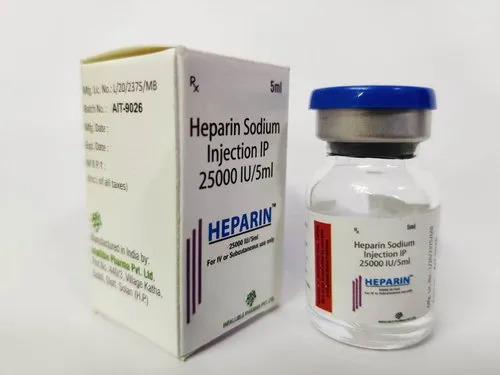With 8 years of Experience & Expertise in global Pharma trades. We bring smiles and satisfaction to your needs through or team of professionals and Global Associations, Sparsh Pharmaceutical Exports manufactures and markets Therapeutic and Prophylactic Pharmaceutical Formulations.We can provide any product anywhere in the world through our Network.
Description
What is the purpose of Heparin Sodium Injection?
Heparin Sodium Injection acts as an anticoagulant. It is used to lessen blood’s capacity to clot and to assist keep dangerous clots from forming in blood arteries. Although it doesn’t really thin the blood, this medication is occasionally referred to as a blood thinner.
Where do you inject Heparin?
Give Heparin via deep subcutaneous injection, IV infusion, or intermittent IV injection (intrafat, i.e., above the iliac crest or belly fat layer). The use of HEPARIN SODIUM INJECTION intramuscularly (IM) is not recommended [see ADVERSE REACTIONS].
How long will I require a Heparin?
Heparin’s effects are transient, hence subcutaneous injection or intravenous infusion are preferable over intermittent intravenous injections for delivery. Then, for the next 7 to 10 days or until the patient is fully mobile, provide 5,000 units subcutaneously every 8 to 12 hours.
What side effects does Heparin Sodium Injection have?
- Advertisement
- stomach or abdominal pain or edoema.
- backaches or back pain.
- when brushing teeth, there is bleeding from the gums.
- urine with blood in it.
- spitting blood up.
- headaches, either severe or persistent.
- significant bleeding or seeping from wounds or cuts.
- stiffness, discomfort, or swelling in the joints.
To know more Click here
What is the duration of a Heparin Sodium Injection?
You will typically receive a deep under-the-skin injection 2 hours prior to surgery and one every 8–12 hours for up to a week following surgery to stop blood clots from developing. This will depend on how you are feeling.
How soon does Heparin Sodium Injection start to work?
Following a straight IV injection or infusion, heparin begins to work right away. works after a deep SC injection in 20 to 60 minutes. Daily blood tests measuring the activated partial thromboplastin time [aPTT] (a measure of how quickly the blood clots) are initially necessary.
How can I tell if Heparin Sodium Injection is doing its job?
A blood test is performed regularly on patients receiving heparin treatment to check on the effectiveness of their dosage. The activated partial thromboplastin time is a blood test used to determine a patient’s heparin level (aPTT). Based on the findings of the blood test, the doctor modifies the heparin dosage.
Why is Heparin administered in hospitals?
Certain blood vessel, heart, and lung diseases can be prevented or treated with heparin. Additionally, open heart surgery, bypass surgery, renal dialysis, and blood transfusions all employ heparin to stop blood clotting.



Reviews
There are no reviews yet.